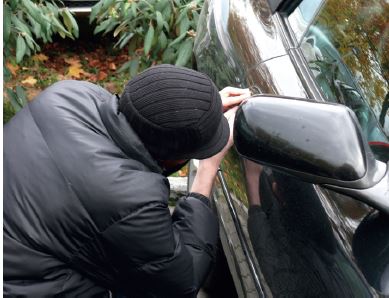
Rise in vehicle related theft is cause for concern
Vehicle related theft has been rising since 2014 yet it is only in May this year that the national papers began reporting on it, citing a lack in police numbers to tackle the 8.8% increase in vehicle thefts in 2018 and a drop in the number of prosecutions.
The upward trend will not surprise those who understand crime trends as the correlation between crime and the economy is well-established. When times are tough crime increases and this revealed itself in the headlines when mopeds became the vehicle of choice for robbery and street crime in London and elsewhere. The numbers of thefts soared so high so quickly that the Metropolitan police established a task-force in 2017 to tackle it and launched a crime prevention campaign called Lock, Chain, Cover. BPA Media Officer Jo Audley and Area Managers, Graham Chapman and Antony Powell attended meetings with the Met police to talk about the Safer Parking Scheme and how car park operators and the BPA could help.
The task-forces’ targeted approach quashed the uprising almost as quickly as it appeared. Westminster, which was a particular hotspot had 334 offences in 2017 but reported an eighty percent reduction 12 months later, a figure that will be familiar to early adopters of the Safer Parking Scheme, who reported the same percentage for vehicle-related crime reduction in their first year. Thus the underlying causes of crime, how it is tackled and the corresponding results show that there is a certain amount of predictability and familiarity when it comes to these offences.
The force attributes its success to intelligence gathered from previous crime data and reports from the public but their message is clear; crime prevention is always the better option as it means there isn’t a victim. In addition, despite the dramatic reduction in crime there is still a risk, and thefts will and do continue to occur.
Despite the newspapers just coming around to this impending crisis, the police have already established a multi-agency task-force that will draw on the tactics deployed by the moped and scooter team, chaired by Policing Minister, Nick Hurd. The last time there was a dedicated task-force was in the mid-90’s during which time the pre-cursor to the Safer Parking Scheme was initiated. In 2003, the Home Office evaluated the scheme and reported their findings in Between the lines: An evaluation of the Secured Car Park Award Scheme. The cost of vehicle related crime to the economy at that time was an estimated £6 billion.
Their research showed that people are aware of crime hotspots in the community and will stay away from places where there is a risk, which not only impacts on car park operator’s income but also local shops. In essence, everyone suffers.
A similar situation is beginning to occur. London may be the UK’s economic engine with the highest density of residents with the fewest number of motorists, but it can still feel the impact of localised crime as Antony Powell, one of the area managers for the city explains. He said: “I had to suspend a couple of car parks in the last 12 months due to high levels of crime and anti-social behaviour. The police assessor and I made a number of recommendations, but unfortunately they weren’t implemented so we had no choice. I have since heard that revenues are suffering because people stay away and that means less money to get the car park back up to standard again. That’s not good for local people or the operating company.”
Graham Chapman, Area Manager for Kent & Essex said: “Anti-social behaviour and car crime have been rising in the vicinity of the car parks I visit, but not in the car park itself, which indicates the scheme does work. However, if issues are left too long before they are tackled it requires more resources and at the moment these are lacking in key posts such as neighbourhood policing.”
In the West Country another kind of user has discovered that car parks are safer places and that’s the homeless. Chas Cannon suspended a couple of car parks due to homelessness and drug paraphernalia. Chas said: “These car parks could have been made safer for motorists, but the car park owners had sympathy for the homeless so our recommendations weren’t implemented and the car parks failed assessment. It is clearly a choice as other car park operators in the area have upgraded security and patrols and they are not experiencing issues.”
The pursuit of profit may not be a priority for a local authority who may be able forgo parking income in an opportunity cost analysis, but over the long term losing a large number of parking spaces every day does not sound like good economic sense, for anybody.
Research conducted by the BPA to find out whether motorists felt differently about parking facilities over time found that location was still the top priority, but personal safety was ranked with equal status, followed by a safe environment out of fifteen possible choices. Motorists also highly rated Park Mark car parks for the scheme’s criteria with 80% saying cleanliness, lighting and environment were good or very good and 65% said they would more likely choose a Park Mark car park in future. So, make sure customers feel confident in their choice by displaying prominently placed posters and signage because crime prevention is in every sense better than cure.







